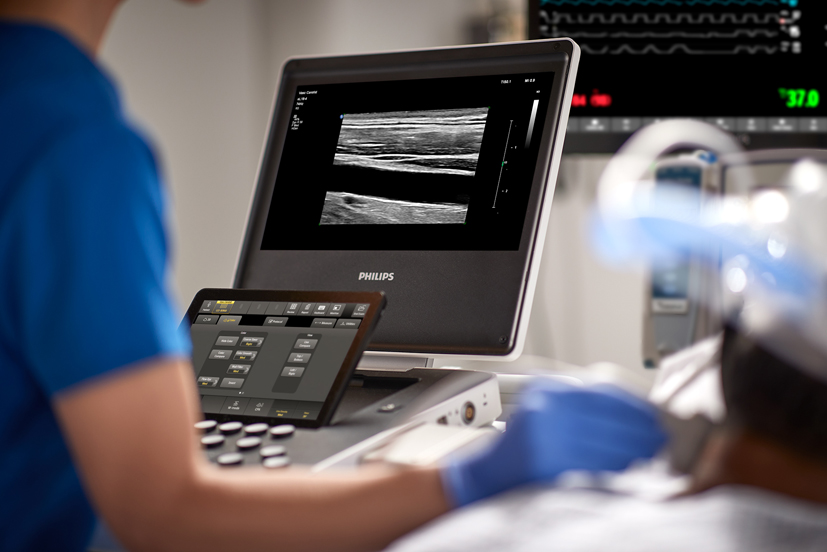Philips launches healthcare innovations at Global Health 2023 in Saudi Arabia towards realizing Vision 2030

- In line with the Health Sector Transformation Program of Saudi Vision 2030, Philips is launching two new healthcare innovations at the Global Health Exhibition 2023 to bring more advanced healthcare access to citizens and support the delivery of patient-centric care, at the right time, in the right place.
- Philips is also highlighting how a shared vision for a better, more data-driven sustainable world is driving partnerships that are accelerating Saudi Arabia’s healthcare transformation to realize a healthier future across the region.
Riyadh, Kingdom of Saudi Arabia (KSA) – Royal Philips (NYSE: PHG, AEX: PHIA), a global leader in health technology, is spotlighting leading healthcare innovations at the Global Health Exhibition taking place at the Riyadh Front Exhibition & Conference Centre (RFECC) from 29 – 31 October 2023. Philips is connecting people, data, and technology, to resolve regional healthcare challenges and establish sustainable access to quality care.
As the Kingdom’s premier healthcare platform, the Global Health Exhibition provides a valuable opportunity to foster meaningful partnerships and co-create solutions that support Saudi Arabia’s rapidly advancing healthcare system, while addressing the broader healthcare needs of the region.
“We are inspired by the rate of healthcare transformation in Saudi Arabia,” says Vincenzo Ventricelli, CEO, Philips Middle East, Türkiye and Africa (META). “Philips has been actively involved in the Kingdom of Saudi Arabia for more than 90 years, and are proud to reaffirm our commitment, as one of the focus markets, to continually introduce best in class innovations that create quality care for future health, today.”
This year, Philips’ showcase at Global Health Exhibition 2023 is centered on its commitment to redesign healthcare around patients and caregivers, enabled by the latest technological innovations and purposeful partnerships.
Expanding patient access to routine surgical care and minimally invasive procedures
One of the Philips innovations being launched in Saudi Arabia during Global Health is the Image Guided Therapy Philips Zenition 10 C-arm; the latest addition to the company’s highly versatile Zenition mobile C-arm series designed to expand patient access to routine surgical care and minimally invasive procedures.
The use of a C-arm offers several benefits in surgery settings. First and foremost, its images help surgeons navigate with precision as they can see the exact location of the surgical instruments, implants, or other devices they’re using – ensuring accurate procedures and reducing the risk of complications. It also allows them to confirm the successful completion of the procedure by verifying results on the spot.
Powered by Philips’ state-of-the-art flat panel detector technology, the Zenition 10 delivers distortion-free images with superb resolution and dose efficiency for performing a wide variety of surgical procedures including orthopedic, trauma, spine, pain management, peripheral vascular, abdominal, urology and general surgical procedures.
The new Zenition 10’s compact design supports fast transport, fast set-up, and fast high-quality imaging, supporting quick decision making and mitigating staff shortages by delivering the speed and efficiency needed to deal with high patient throughput – enabling surgeons to treat more patients at a lower cost.
First-time-right diagnosis for more patients
Philips is also launching a next-generation portable ultrasound solution for the META region – the new Compact 5000 Series – to facilitate first-time-right ultrasound exams for more patients.
Premium quality ultrasound imaging has previously been confined to larger cart-based systems, which while technically portable, are typically located within a specific department. This often means that patients need to move from a hospital ward to the appropriate department for their ultrasound exams, which can negatively impact the patient experience and create logistical problems that limit patient throughput. The portability of the new Ultrasound Compact 5000 Series brings quality ultrasound to the patient wherever they are located in the hospital, with advanced features not typically found on a portable system, including AI-powered automation tools.
This newest innovative system also features Philips Collaboration Live tele-medicine software, with the ability to call on additional clinical expertise via secure voice, text, screen sharing, and video streaming from anywhere with a mobile or internet connection. Collaboration Live even allows a remote user to control the unit’s settings to acquire diagnostic quality images, reducing the need for follow-up scans and patients having to travel to a central hospital facility[1].
Designed for shared service capabilities across specialties including cardiovascular, obstetrics and gynecology, point of care, and general imaging, the Compact Ultrasound 5000 series system helps meet the needs of multiple clinical segments, while effectively tapping into the Kingdom’s advanced healthcare infrastructure.
Partnerships with purpose unlock the power of technology
“We are excited to be part of the ambitious Saudi Vision 2030, which ties in seamlessly with our goal of innovating to make the world healthier and more sustainable,” says Ventricelli. “Collectively, we have made substantial gains to realize this vision, and have enjoyed significant milestones in the Kingdom through our active partnerships, and by harnessing the power of technology.”
Through ongoing landmark partnerships, Philips has assisted in creating nation-wide cardiology and radiology networks to realize world-class connected care. In the first, Philips linked cardiac centers across Saudi Arabia to provide clinicians with seamless access to specialist care and information sharing between connected healthcare facilities. Integrating these disparate cardiology systems around the Kingdom, is helping to reduce data entry, simplify access to test results generated in other departments, and making it easier to acquire, analyze and share patient data – enhancing the efficiency of the Cardiology workflow.
The second includes an AI-enabled radiology solution to optimize radiology operations and resources, while creating better experiences for health professionals, and better healthcare outcomes for patients.
Philips has also delivered the first AI-enabled Tele-ICU in the region to improve critical care. The eICU model put an intensivist-led team in a central monitoring facility where they can be responsible for remote monitoring of ICU-beds. Through the solution, connected ICUs are receiving supplementary support, in addition to the bedside teams, for a positive reduction in mortality, lengths of stay and cost of care.[2]
Philips has also co-created an AI-ecosystem and an AI Lab that incorporates education, science, and technology, supported by knowledge sharing via worldwide collaborations, with strategic local partners.
These efforts collectively promote advanced technologies in the health field, support expertise exchange, and develop national capabilities, to enhance the quality of health services, while supporting the Kingdom’s ambitions to become a data and AI-driven economy – making Saudi Arabia one of the world’s most technologically advanced countries.
“Collaborative efforts like these are what it will take to accelerate the transformation of healthcare in a sustainable and long-term fashion,” says Ventricelli. “I am delighted by the pace at which digital health solutions are being adopted and implemented, and the growing confidence healthcare leaders in Saudi Arabia have in the capabilities of the country’s healthcare system to deliver on quality care.”
[1] Collaboration Live may not be available in all geographies.
[2] Philips eICU program, telehealth for intensive care | Philips

















